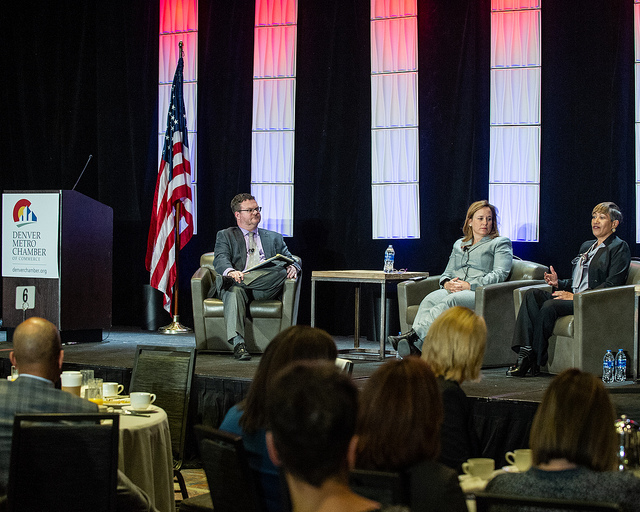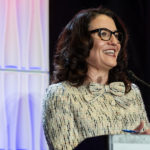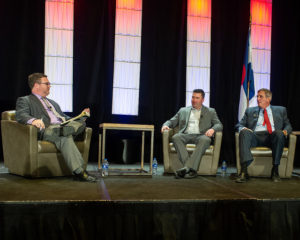
As legislators of the Colorado General Assembly prepare to start the 2019 session on Friday, Denver Metro Chamber of Commerce President and CEO Kelly Brough encouraged a focus on the issues foundational to our economy – infrastructure, education and health care.

“These three pillars are the fundamental responsibility of government, and in Colorado all three of our pillars face dire challenges,” Brough told 450 business leaders and elected officials at the Business Legislative Preview – presented by the Chamber and the Colorado Competitive Council and sponsored by Fidelity Investments – on Thursday. “As we look at this session, before we consider expanding the mission or the work of state government, we ask that we focus on shoring up our pillars – the critical issues that we face in the state.”
Denver Business Journal Capitol reporter Ed Sealover discussed expectations for the 2019 session with leaders from the House and the Senate – Speaker of the House KC Becker (D-Boulder) and Business Affairs and Labor Committee Chair Angela Williams (D-Denver), as well as House Minority Leader Patrick Neville (R-Castle Rock) and Assistant Senate Minority Leader John Cooke (R-Greeley).
See what they had to say about those issues, and what we can expect over the next 120 days.
Education and Workforce

Legislators noted the importance of education heading into 2019. Democrats focused on increasing funding for all education, but also ensuring students are prepared: “We need to ensure we’re delivering and we have some accountability,” Williams said.
Meanwhile Republicans looked toward reform and local opportunities to fund schools: “A one-size-fits all system fits for no one,” Neville said.
Becker emphasized the importance of higher education, and its impact on building a homegrown workforce: “We also need to be keeping our talent in state with really strong higher education institutions,” she said.
Brough noted the challenges of educational funding, from kindergarten to higher education.
“We are building one of the best economies in our country – a knowledge-based economy,” Brough said, noting that 74 percent of jobs in the state will require some post-secondary education by next year. “We’re nowhere (near) preparing our kids for these opportunities. It is a crisis.”
Health Care
From cost of care to improving transparency on those costs, health care will be a focus for both parties.
“I should be able to go to that medical center and go to this one and say, ‘What does this procedure cost?’ Then I can make an informed decision as a consumer where I want to go,” Cooke said.
Over the past 18 months, the Chamber has brought together member companies from across the health care system to work together to find solutions, focusing on employer-funded health care options, which cover about half of Coloradans.
“I think that’s a critical first step to getting all the right people in the room,” Becker said, adding, “Everyone needs to be part of the solution.”
Infrastructure
While infrastructure is a wide-ranging topic, from water and energy to broadband and transportation, legislators were asked specifically about transportation funding and how to address a $7.1 billion shortfall in the wake of two measures on transportation funding failing to pass at the ballot.
Leaders of both parties agreed that transportation continues to be a challenge but differed on where the solution may lie. Democrats urged bringing stakeholders back to the table to discuss a solution that includes a new revenue stream.
“The transportation issue has not gone away and will not go away,” Williams said. “We cannot bond without a revenue stream.”
Republicans emphasized increasing funding to transportation and revisiting efforts that would not lead to a new tax. “We have to look for other ways,” Neville said.
In her opening remarks, Brough cautioned: “We can’t just solve it for the metro area; we must solve it for our state.”
While Democrats may hold the majority in both houses, “Collaboration is going to be critically important during this legislative session,” Williams said.
Cooke highlighted that over the last four years, Colorado has had a split legislature, but that about two-thirds of bills have passed, highlighting the bipartisan efforts. But, he added, “we’re going to hold the majority accountable.”
Keep up to date here with the latest business policy news and positions the Chamber takes on behalf to the business community, including its 3,000 member business and the 300,000 people they represent – a lot happens between now and May 3.
“We’ll have lots of opportunity and challenges this next session,” Brough said.
Photos by Dave Anderson of InSync Photography + Design.
Sara Crocker is the communications manager for the Chamber.
